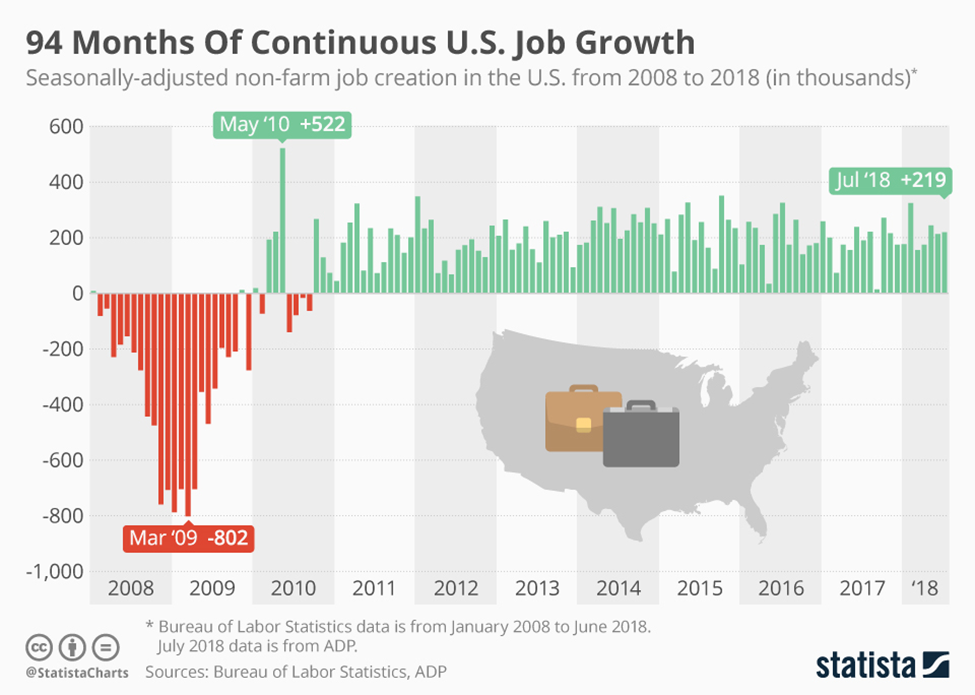|
We’re constantly bombarded with a litany of articles, studies and discussions highlighting the generational differences in the workplace. These discussions often confuse and mislead readers by zeroing in on ‘key characteristics’ which supposedly define a generation while subtly stereotyping it at the same time. One of the topics that comes up often in these discussions is what makes for a good employee. This topic has permeated the business world for decades long before Gen-Z and Millennials entered the workplace over the last 10+ years causing a current day telenovela in the business world.
While the generations entering the workforce, and or exiting for that matter, may have a difference of opinion on what they want out of their careers and what they need in order to be happy in their jobs, there is one common trait which is synonymous with all generations and all employees for that matter. This common trait, or behavior, defines what a good employee is regardless of the stereotypes and or characteristics which accompany the respective generation. When we take away generational characteristics, race, religion, gender and everything else used to categorize and therefore sort and stack people we’re left looking at people’s actions. Their behaviors. What I’ve found true over the years is behavior is indicative of the true nature of a person, not their words. If we say one thing but then do (act) another, our behaviors become the defining force for who we are, not our words. This is certainly true for employees and their effectiveness as we look at whether an employee is ‘great’ versus ‘average’, or worse. So, what’s the difference between a great employee and an average one? An employee who excels versus one who mails it in operating at a mediocre level of performance. The difference is a little behavior known as INITIATIVE. I know what you’re thinking, “that’s not groundbreaking information. I’ve known this for years.” While we may know this, or have seen it in person, what’s remarkable are the number of people who actually deploy ‘initiative’ in their jobs. In my 15 years’ of business experience, of which 13 of those years have been in management, and 4 owning a business, I’ve experienced both first and secondhand the difference initiative makes in an employee and leader. When we strip away all the categories and demographics, mentioned above, this behavioral trait is the one that keeps rising to the top distinguishing the great performers from the average, mediocre and under performing employees. Initiative is everything! What does initiative look like in a business setting? When I think of great initiative in the work place the first thing that comes to mind is a situation I witnessed firsthand with an employee of mine several years ago. We had a client who was flying into Orange County to visit with several suppliers, our company being one of them. My employee, Megan, took it upon herself to pick up our client at the airport, coffee in hand, and bring them to our office for the meeting. Talk about service, yet her initiative to provide a great experience for our customer didn’t end there. She also took the client out to lunch in Laguna Beach (our client was from Idaho and had never seen the amazing beaches of Laguna). The client had also forgot to pack a bathroom bag for their travels so Megan took him to Target to pick up a couple items. After all this was done Megan shuttled him back to the airport. Yes, this was an amazing effort by Megan yet what made it truly remarkable and just as memorable was the fact that she did this all on her own. She didn’t ask for permission; she just took it upon herself to deliver top notch service. Memorable service at that. I still think about the initiative Megan displayed during this time and marvel at how impressive it was. Needless to say the client sent us an overwhelming email of appreciation thanking Megan for her time and willingness to shepherd him around. He said and I quote “It was the best business trip I’ve been on, I appreciate you [Megan] taking the time to ensure I had a good visit.” While that story sounds great it’s certainly not the norm. Rather than focusing next on the lack luster initiative most employees display at the office perhaps its better use of your time and mine to discuss the ways an employee can change their mindset and actions to better align with an initiative based work approach. Consider the following:
Key Takeaway: Possessing good initiative at work makes or breaks the quality of employee you are and often times how you are viewed in the organization. Are you a blessing to your team and company or are you dead weight? Having good initiative is the one behavior you can 100% control which in turn can directly impact in a positive way your job and career. Action Item: Stop making excuses for why you don’t act at work. Next time you see a problem or issue come up at the office which you are directly or close too take a chance and stand up and get involved. People who say ‘YES’ I can do that rather than ‘someone else can do that’ frequently experience better career
0 Comments
As a child I dreamt of being a business owner. While the other kids in the neighborhood were talking about being pro athletes I always imaged myself starting a business. At the spry age of 10 I opened my first business in the early 90's in my parents basement in rural New York selling used skateboard parts. It was exciting! I had a business sign which proclaimed ‘Sk8 Parts’, a rack to display my shoddy products for sale and even a chair to sit on while waiting for the sales to come rolling in. After a summer being in business I had only made one sale a set of dirty and worn out skateboard wheels for a measly fifty cents to a kid down the street. That sale bought me a pink panther ice cream from the neighborhood ice man. While the business didn’t rocket me to instant success like I had envisioned I was hooked on the idea of being a business owner in the future so I could buy the whole ice cream factory, not just one pink panther. As I got older I tried my hand at inventing all sorts of things, products that I thought would get me rich, if I could only figure out a way to sell a few million of them. First it was a gaming chair, then workout towels and even a handheld flashlight projector. My entrepreneurial dreams ended at the time with a website I tried to start in 2006 that would allow people to ask questions and get advice based off real life business situations they were dealing with. That was a $2k boondoggle which went nowhere.
It wasn’t until the summer of 2015 that I would find my way, diving head first into entrepreneurship by starting Square-1 Engineering. Thankfully I had a lot of help from many close people around me (wife, parents, friends) who all were incredibly supportive. Four years into my current entrepreneurial journey I’ve learned and experienced firsthand many things which have helped me navigate my way to present day. Of all these experiences, learning lessons and awareness gained there are eight which have brought about the biggest positive impact in helping me weather the entrepreneur start up storm: 1.Get A Mentor This is the single second best decision you’ll ever make in business. The first best decision is to become an entrepreneur. Mentors have experience which you can learn from helping you avoid mistakes along the way. 2.Support Gets You Over The Hump Make sure those close to you understand your vision and support it. They don’t have to buy in 100% but if it’s you against the world there are going to be some very long nights in store. If you are married it’s vital your spouse understands the opportunity and supports it, even in the down times. 3.Some Things CAN Wait Some people will tell you it’s important to write a business plan, vision, mission, blah blah blah, right away. Unless you’re in a situation where you need to ask for capital to start the business the best thing to do is put those things aside and focus all your efforts on how to make money. Ultimately being an entrepreneur means you’re selling something to someone so the more time you spend on how you’re going to get paid for the product or service you’re providing the better off you’ll be. 4.You Can’t Be Everything to Everyone I failed miserably here. When I did start to get customers I tried to offer them everything under the sun in order to get their business. Some times it worked, often times it created a nightmare for me as now I had to deliver the goods. Never over promise, you’ll most likely end up under delivering. Find one or two areas you can become an expert in, one or two problems you can solve for your customers. Do that and only that before you start getting into other areas of opportunity. 5.Having a Plan-B is Dangerous I’ve read countless articles about “the power of having a ‘plan-B’ ” or an alternative course of direction. I hate that advice. As an entrepreneur if you don’t believe in what you’re doing and have a plan-B set up in case you fail you’re almost destined to set yourself up for disappointment. I’m not saying it’s not important to plan ahead for bumps in the road but if you’re going to start a business that should be your one and only focus. Anything other than a mentality of success has no place for you. Visualize to materialize. 6.Outsource Work The first several months I attempted to handle all the accounting and finance portions of the business only to realize two things: 1 – I’m not good at it nor do I like it; 2 – I created more problems than I remedied. Best advice I got was to pay the money to get a reliable CPA that understood my business and could help scale it up by making good decisions. Best money I’ve ever spent was a CPA. 7.The Power Of Saying ‘No’ Crucial to your success as an entrepreneur is the ability to politely and professionally say ‘no’. Similar to ‘you can’t be everything to everyone’ saying ‘no’ is harder than it sounds. Naturally you want to say yes to everyone, making everyone around you happy, especially if it’s a customer. Unfortunately, when we do this we get pulled in a hundred directions which causes us to deviate from our destined course. If you are asked to do something and it doesn’t align with your top 2 or 3 priorities politely decline and thank the person for the opportunity to be considered, even if it is a customer. 8.Breathe, It’ll Be Okay Very few things in life actually have the ability to stop you from moving forward in your new business. When bumps in the road momentarily derail you (you will experience plenty of bumps along the way) take a deep breath and be thankful for the opportunity to learn and grow as a professional. Stephen Covey put it best when he gave us the 90/10 principle: “10% of life is made up of what happens to you, 90% of life is decided by how you react.” – Stephen Covey
|
Visit Square-1's
|
|

















 RSS Feed
RSS Feed


